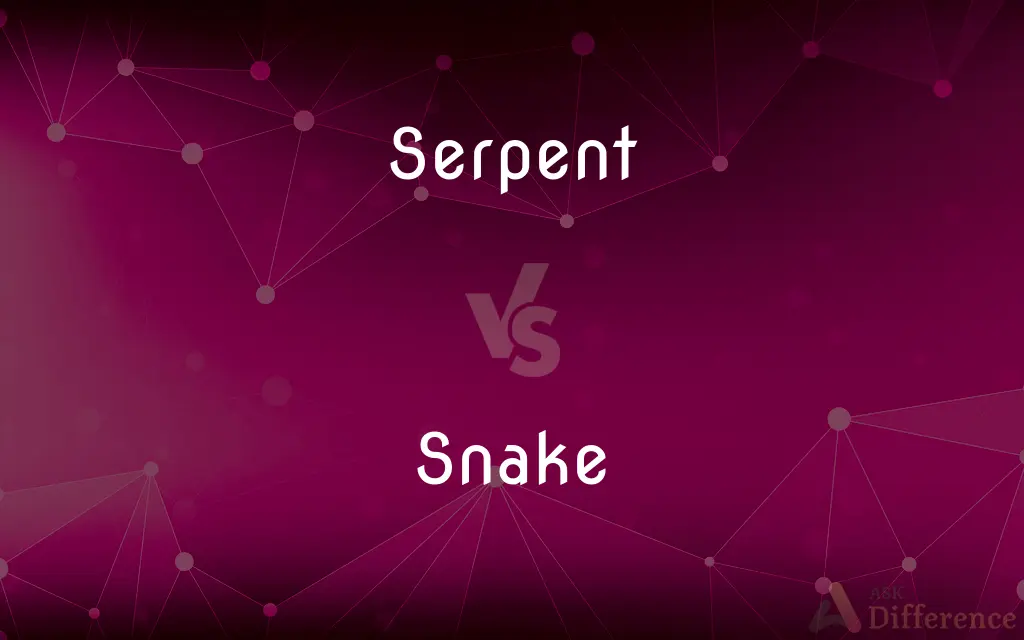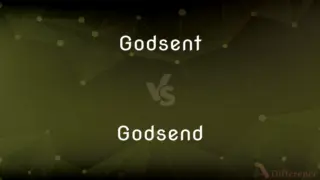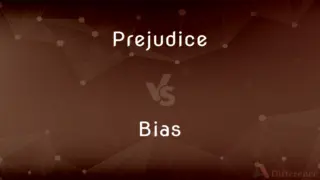Serpent vs. Snake — What's the Difference?
By Tayyaba Rehman — Updated on October 21, 2023
"Serpent" often refers to a large snake or a mythical creature and carries symbolic or literary connotations, while "snake" is a general term for legless reptiles of the suborder Serpentes.

Difference Between Serpent and Snake
Table of Contents
ADVERTISEMENT
Key Differences
"Serpent" and "snake" both describe legless reptiles, but they have distinct nuances. The term "serpent" is ancient and is frequently found in religious, mythical, or symbolic contexts. For instance, many cultures and religions have serpents representing good or evil forces. On the other hand, "snake" is a straightforward term for these reptiles and lacks the same depth of symbolism.
In literature and folklore, the serpent is often depicted as wise, cunning, or even deceptive. This portrayal contrasts with the straightforward biological classification of a snake, which lacks such cultural baggage. Although both can be used interchangeably in some contexts, the word "serpent" adds a layer of mystique or gravity.
When referring to specific species or discussing the biology of these creatures, "snake" is the preferred term. For example, one would talk about a rattlesnake or a python. Conversely, in stories where a creature's presence signifies temptation, danger, or wisdom, the term "serpent" might be more appropriate.
It's also interesting to note that "serpent" is sometimes used metaphorically in English to denote a treacherous person. While "snake" can similarly describe someone deceitful, its usage is more colloquial. In essence, the word choice between "serpent" and "snake" depends on context and the intended nuance.
Comparison Chart
Connotation
Often symbolic, mythical, or religious
More neutral and biological
ADVERTISEMENT
Common Use
Literature, folklore, religious texts
Biology, casual conversation
Representation
Wisdom, cunning, temptation, evil, or mythology
A specific group of legless reptiles
Metaphoric Usage
Used to describe a treacherous or wise person
Colloquially used for a deceitful person
Examples
The serpent in the Garden of Eden
Rattlesnakes are venomous snakes
Compare with Definitions
Serpent
A large snake or mythical creature.
The ancient tales often spoke of a giant serpent.
Snake
A legless reptile of the suborder Serpentes.
The desert is home to many species of snakes.
Serpent
A symbol of wisdom, temptation, or evil in various cultures.
The serpent is seen as a symbol of deception in many stories.
Snake
A person who acts deceitfully or treacherously.
He's a snake for spreading those rumors.
Serpent
A treacherous or deceitful person, metaphorically.
He turned out to be a serpent, betraying his closest allies.
Snake
A long, slender tool or device, like a plumber's tool.
The plumber used a snake to clear the clogged drain.
Serpent
A legless reptile, especially in a literary context.
The hero had to face a fierce serpent to retrieve the treasure.
Snake
To move sinuously or in a winding manner.
The road snakes through the mountains.
Serpent
A winding or sinuous thing.
The river was a serpent, winding its way through the valley.
Snake
Snakes are elongated, limbless, carnivorous reptiles of the suborder Serpentes . Like all other squamates, snakes are ectothermic, amniote vertebrates covered in overlapping scales.
Serpent
(Zoology) A snake.
Snake
See Shoshone.
Serpent
Often Serpent In the Bible, the creature that tempted Eve, identified in Christian tradition with Satan.
Snake
See Hydra.
Serpent
A subtle, sly, or treacherous person.
Snake
Any of numerous scaly, legless, sometimes venomous squamate reptiles of the suborder Serpentes (or Ophidia), having a long, tapering, cylindrical body and flexible jaws.
Serpent
A firework that writhes while burning.
Snake
A treacherous person. Also called snake in the grass.
Serpent
(Music) A deep-voiced wind instrument of serpentine shape, used principally from the 1600s to the 1800s, about 2.5 meters (8 feet) in length and made of brass or wood.
Snake
A long, highly flexible metal wire or coil used for cleaning drains. Also called plumber's snake.
Serpent
Serpent Serpens.
Snake
To drag or pull lengthwise, especially to drag with a rope or chain.
Serpent
A snake, especially a large or dangerous one.
Snake
To pull with quick jerks.
Serpent
(figurative) A subtle, treacherous, malicious person.
Snake
To move in a sinuous or gliding manner
Tried to snake the rope along the ledge.
Serpent
(musical instruments) An obsolete wind instrument in the brass family, whose shape is suggestive of a snake (Wikipedia article).
Snake
To move with a sinuous motion
The river snakes through the valley.
Serpent
A kind of firework with a serpentine motion.
Snake
A legless reptile of the suborder Serpentes with a long, thin body and a fork-shaped tongue.
Serpent
To wind or meander
Snake
A treacherous person; a rat.
Serpent
To encircle.
Snake
Somebody who acts deceitfully for social gain.
Serpent
Any reptile of the order Ophidia; a snake, especially a large snake. See Illust. under Ophidia.
Snake
A tool for unclogging plumbing.
Serpent
Fig.: A subtle, treacherous, malicious person.
Snake
A tool to aid cable pulling.
Serpent
A species of firework having a serpentine motion as it passess through the air or along the ground.
Snake
(Australia) A flavoured jube (confectionary) in the shape of a snake.
Serpent
The constellation Serpens.
Snake
(slang) Trouser snake; the penis.
Serpent
A bass wind instrument, of a loud and coarse tone, formerly much used in military bands, and sometimes introduced into the orchestra; - so called from its form.
Snake
(maths) A series of Bézier curves.
Serpent
To wind like a serpent; to crook about; to meander.
Snake
(cartomancy) The seventh Lenormand card.
Serpent
To wind; to encircle.
Snake
An informer; a rat.
Gem’s a snake for Kamale, man.
Serpent
Limbless scaly elongate reptile; some are venomous
Snake
(intransitive) To follow or move in a winding route.
The path snaked through the forest.
The river snakes through the valley.
Serpent
A firework that moves in serpentine manner when ignited
Snake
To steal slyly.
He snaked my DVD!
Serpent
An obsolete bass cornet; resembles a snake
Snake
(transitive) To clean using a plumbing snake.
Snake
To drag or draw, as a snake from a hole; often with out.
Snake
(nautical) To wind round spirally, as a large rope with a smaller, or with cord, the small rope lying in the spaces between the strands of the large one; to worm.
Snake
(MLE) To inform; to rat.
He says he didn't snake and I believe him.
Snake
Any species of the order Ophidia; an ophidian; a serpent, whether harmless or venomous. See Ophidia, and Serpent.
Snake
To drag or draw, as a snake from a hole; - often with out.
Snake
To wind round spirally, as a large rope with a smaller, or with cord, the small rope lying in the spaces between the strands of the large one; to worm.
Snake
To crawl like a snake.
Snake
Limbless scaly elongate reptile; some are venomous
Snake
A deceitful or treacherous person
Snake
A tributary of the Columbia River that rises in Wyoming and flows westward; discovered in 1805 by the Lewis and Clark Expedition
Snake
A long faint constellation in the southern hemisphere near the equator stretching between Virgo and Cancer
Snake
Something resembling a snake
Snake
Move smoothly and sinuously, like a snake
Snake
Form a snake-like pattern;
The river snakes through the valley
Snake
Move along a winding path;
The army snaked through the jungle
Snake
To sneak or move stealthily.
He tried to snake his way into the party without an invitation.
Common Curiosities
Why is the term "serpent" common in religious texts?
"Serpent" often symbolizes wisdom, temptation, or evil in various religious and cultural contexts.
Is a serpent the same as a snake?
While they can be synonymous, "serpent" often has mythical or symbolic connotations, while "snake" is a general term for legless reptiles.
Are all snakes serpents?
In a general sense, all snakes can be called serpents, but not all "serpents" in literature or myth are necessarily snakes.
Can "snake" refer to something other than a reptile?
Yes, it can refer to a tool, a winding movement, or a deceitful person.
How can I differentiate between a serpent and snake in a story?
Context is key; serpents often carry deeper symbolic meaning, while snakes might simply be a creature in the story.
Are there snakes that aren't called serpents?
In everyday language, all snakes can be termed serpents, but context matters, especially in literature or myth.
When should I use "serpent" over "snake" in writing?
Use "serpent" for symbolic, mythical, or literary contexts and "snake" for biological or casual references.
Is calling someone a "snake" the same as calling them a "serpent"?
Both can imply deceit, but "serpent" is more formal and "snake" is colloquial.
Are serpents always seen as evil in myths?
No, serpents can represent a range of attributes, including wisdom or protection.
Do all snakes have venom?
No, only some species of snakes are venomous.
What's the serpent's role in the Garden of Eden story?
The serpent tempts Eve to eat the forbidden fruit, leading to humanity's fall.
Is the portrayal of serpents consistent across cultures?
No, serpents can be heroes, villains, protectors, or symbols, varying widely across cultures.
Why do some cultures worship serpents?
Serpents can symbolize fertility, protection, or other attributes, leading to reverence in some cultures.
Do the terms have different origins?
Yes, "serpent" comes from the Latin "serpens," meaning "to crawl," while "snake" has Germanic origins.
Can I use "serpent" in a scientific context?
"Snake" is more appropriate for scientific contexts, while "serpent" is better for literary or symbolic ones.
Share Your Discovery

Previous Comparison
Godsent vs. Godsend
Next Comparison
Prejudice vs. BiasAuthor Spotlight
Written by
Tayyaba RehmanTayyaba Rehman is a distinguished writer, currently serving as a primary contributor to askdifference.com. As a researcher in semantics and etymology, Tayyaba's passion for the complexity of languages and their distinctions has found a perfect home on the platform. Tayyaba delves into the intricacies of language, distinguishing between commonly confused words and phrases, thereby providing clarity for readers worldwide.














































